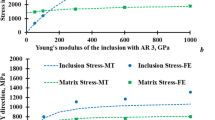Abstract
The multi-stage nested return algorithm is an efficient approach for implementing plasticity and damage models that addresses issues of nonuniqueness and nonconvergence, and which was previously shown to perform well in a variety of verification tests. Straightforward modifications to this algorithm are shown to improve the robustness for high-curvature yield surfaces and nonlinear hardening laws. Improved methods for computing the initial “fast return” are presented with application to two-surface geomodels. These modifications reduce the need for subcycling while maintaining the efficiency of the algorithm.












Similar content being viewed by others
References
Brannon R, Fossum A, Strack O (2009) Kayenta: theory and user’s guide. Sandia Report (2282)
Brannon R, Leelavanichkul S (2010) A multi-stage return algorithm for solving the classical damage component of constitutive models for rocks, ceramics, and other rock-like media. Int J Fract 163(1–2):133–149
Brannon RM (2007) Elements of phenomenological plasticity: geometrical insight, computational algorithms, and topics in shock physics. In: Horie Y (ed) ShockWave science and technology reference library. Springer, Berlin, pp 225–274
Clausen J, Damkilde L, Andersen L (2007) An efficient return algorithm for non-associated plasticity with linear yield criteria in principal stress space. Comput Struct 85(23):1795–1807
Coombs WM, Crouch RS (2011) Non-associated reuleaux plasticity: analytical stress integration and consistent tangent for finite deformation mechanics. Comput Methods Appl Mech Eng 200(9):1021–1037
Crouch RS, Askes H, Li T (2009) Analytical CPP in energy-mapped stress space: application to a modified Drucker–Prager yield surface. Comput Methods Appl Mech Eng 198(5):853–859
Homel MA, Guilkey J, Brannon RM (2015) Numerical solution for plasticity models using consistency bisection and a transformed-space closest-point return—a nongradient solution method. Comput Mech (in press)
Acknowledgments
The authors are grateful for the support received from the Perforating Research Group within Schlumberger Technology, Ltd, Harvey Williams, Director.
Author information
Authors and Affiliations
Corresponding author
Rights and permissions
About this article
Cite this article
Homel, M.A., Brannon, R.M. Relaxing the multi-stage nested return algorithm for curved yield surfaces and nonlinear hardening laws. Int J Fract 194, 51–57 (2015). https://doi.org/10.1007/s10704-015-0031-4
Received:
Accepted:
Published:
Issue Date:
DOI: https://doi.org/10.1007/s10704-015-0031-4




